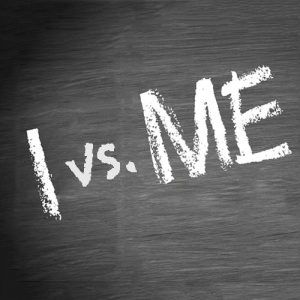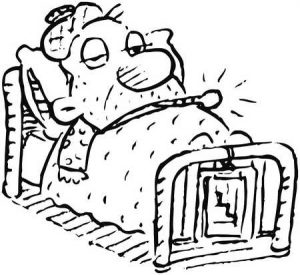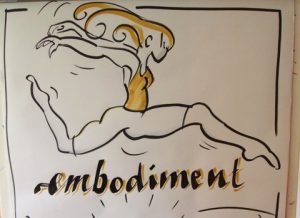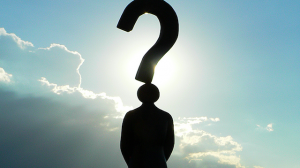Who am ‘I’? What is ‘me’? In sickness, health, and (near)death?
June 23rd, 2017 | Published in Later life
‘I’ have seen the end of the tunnel. While a medical team worked on ‘me’ after a cardiac arrest on the operating table.
operating table.
‘I’ feel like ‘I’ am trailing a bucket of faulty machinery. That bucket is the embodied ‘me’.
‘I’ have hope and passion, ideals and belief in social justice. The embodied ‘me’ too often feels defeated by the obstacles.
‘I’, in other words, resembles a disembodied spirit, although such a concept fits poorly with atheism.
If ‘I’ could choose between ‘I’ and ‘me’, ‘I’ has a lot of appeal. But, I don’t think it works that way, does it?
George Herbert Mead, a social philosopher, also distinguished ‘I’ and ‘me’, but in a somewhat different sense. Mead matched ‘me’ with Freud’s ‘censor’, and ‘I’ with Freud’s ‘ego’ although, as in the distinction I make, Mead’s ‘I’ is also subject compared with ‘me’ as object.
I sometimes wonder if my experiences are unusual, or if other people would recognise a distinction between their ‘I’ and their ‘me’.
‘I’ have seen the end of the tunnel

The end of the tunnel sounds like a cliché, but it really is a thing. ‘I’ have seen the end of the tunnel. There was nothing there, although it was a compelling experience, at least in retrospect. One I haven’t been able to lay to rest, and so decided to write about. I’m hoping I might hear back from others who have made sense of similar experiences.
It was supposed to be a routine operation – to insert stents in my coronary arteries – and I didn’t pay much attention to the raised, urgent voices around me. I was more attuned to a voice over to the side of me calling:
“Are you still with us, Joan?” “Are you still with us, Joan?”
I believe I answered with a groggy and possibly uncertain “Yeees”.
The voice was embodied. He looked like a ‘70s hippie, propped casually against a stack of white metal frames, possibly bed parts. He wasn’t wearing a medical gown. He looked pretty relaxed. One arm hung loosely down his side, one in his lap. One leg was on the floor, one was raised a little to keep his balance. (Actually, he looked a lot like my husband in his earlier years. Peter was never a hippie, but he did have the beard for some years.)
Was he for real, my hippie support person? I don’t know, although I do know he was not my husband. I was, however, more aware of his presence and his voice than of the people immediately surrounding me. I don’t have any memory of what they were doing. They must have put me under heavier anaesthetic as part of the process, because the next I knew someone was talking to me in the recovery room.
I don’t believe in an afterlife, but I do wonder about this sense of an ‘I’ that can seem to exist outside (and above, in this case) the embodied ‘me’. Is this a distinction others can relate to? Does it connect, for example, to the dissociation that can occur during childhood trauma? Does it perhaps reflect a drive to be seen as more than a body, especially if the body is labelled as somehow flawed? Might it connect to religious belief in the soul for some people?

‘I’ feel like ‘I’ am trailing a faulty appendage
My body has been behaving badly for some time. I have heart and lung disease and stubbornly low iron levels despite more than six months of supplementation. I also have a range of non-life-threatening chronic diseases (bones, joints, airways, and eyes).
 The heart disease, lung disease, and iron deficiency each individually cause breathlessness, weakness, and tiredness. Their combination can leave me feeling like a beached whale (although not a very big one).
The heart disease, lung disease, and iron deficiency each individually cause breathlessness, weakness, and tiredness. Their combination can leave me feeling like a beached whale (although not a very big one).
The thing is that this all feels like it’s happening to the embodied ‘me’ and that ‘I’ should be able to rise above it. The trouble is the ‘I’ that holds hope and passion, ideals, and belief in social justice does not (unlike during my near-death experience) feel like it has a separate existence. It is trapped in this unravelling machine.
Should ‘I’ be able to rise above the embodied ‘me’? One obstacle is that ‘I’ depend on a functioning brain, and on really bad days that seems to shut down too. I’m not even going to try to probe the connection between ‘I’ and the brain (except to reject the possibility that the former is reducible to the latter).
In times of relative health
The distinction between ‘I’ (as spirit?) and ‘me’ (as embodied human) only seems to come to the surface  during times of crisis – either serious illness or serious emotional distress.
during times of crisis – either serious illness or serious emotional distress.
Interestingly, since starting to write this post, I have been put on additional heart medication, and am feeling substantially better. ‘I’ am no longer distinct from ‘me’. Of course it’s good to feel relatively well, but there’s a sense of loss as well. The integrated existence is relatively prosaic.
Recycling some of the questions
- Who then am ‘I’ and what is ‘me’ – in sickness, trauma, health, and (near)death?
- To what extent can ‘I’ rise above the embodied ‘me’ – in life? Does health determine the limits?
- What is the meaning of that sense of a distinct separation between ‘I’ and ‘me’ during a near-death experience and/or traumatic circumstances?
- What happens to ‘I’ after death?
There are, I realise, no definitive answers to these questions. I wanted to put them on record for myself, but also in the hope that they (or similar) may have arisen for other people. I would love to hear.

Scroll down for comments
First-time comments have to be moderated. I try to complete that process, and respond, within 24 hours.
Do check back.
Social justice is for everyone (previously 2020socialjustice) is also on Facebook (click here)
Twitter (click here)



Interesting to read these comments and people’s experience of the ‘I’ and ‘Me’ subject. I had an out of body experience many years ago,but it was so vivid and wonderful i have never forgotten it. I was having anaesthesia for a dental procedure and I felt the top of my head explode open and i was free. I was walking with my father, I had no need to look at him to know it was him. We were walking along a tunnel with a bright light at the end. The overpowering felon i had was one of pre happiness everything had been explained, everything was right.I have never felt this before or after this experience and as i came round i could feel it slipping away, and the loss was so terrible that i started to cry. By the way my father was still alive at the time! I know there are states of mind where the brain is deprived of oxygen and other gases, that give rise to euphoria, and maybe that is one explanation. I don’t have a faith, consider myself agnostic rather than atheist, but I think that time is a major factor I this life,so perhaps when we die we are threaded from and there is only the sense of being I the”now”, or as my grandson says the word ‘is’ encompasses all that exists, that has ever existed, or will exist I future,but because we are no longer constrained by time everything is there for us. Bit difficult to explain, maybe like Schrodinger’s cat? Alive and dead?
“…everything had been explained, everything was right…”. Just thinking about the possibility of having that feeling is a good feeling, so I can imagine that to have had it and lost it again would be devastating.
I don’t have a faith either, and there may well be physical explanations of the kind you suggest, but it’s the experience itself I find fascinating. Thanks for providing yours.
I found this comment in an article abour near-death experiences interesting to think about:
“Writing about near-deaths means trying to penetrate that space where death could be imminent but living still remains a possibility. Whereas death is the end of life as we know it, and as others around us are living it, having a near-death experience means someone’s been given an opportunity that most other people haven’t had. Survivors might rightfully feel anointed—or guilty. A few might even wish they’d died, even though their survival had seemingly required supernatural interference or assistance from faith, if not fate. Their lives should have greater meaning now than mere existence. Or should they? Maybe there’s some larger mission to complete, something better to do, someone to love, or mourn.” http://www.newyorker.com/books/page-turner/the-mysterious-power-of-near-death-experiences?mbid=nl_TNY%20Template%20-%20With%20Photo%20(29)&CNDID=38109082&spMailingID=11443613&spUserID=MTMzMTg0NDQyMTY2S0&spJobID=1200870564&spReportId=MTIwMDg3MDU2NAS2
Doryman’s observations strengthen my interest in our (us in me) existing as a sort of co-operative of bits- some cerebral and electrical, some physical and mechanical…a gestalt in which of course we seem much more than we are. I like to think that memory and experience form a good part of our inner conversations. Maybe our health or lack of it at times is a part of the language that exists between our parts.
Hello, Joan,
May I offer the compelling observation that our lives, in retrospect turn out to be a surprise – not what we expected. Stuff happens. We have experiences that change how we see the world and our place in it, yet our old paradigms remain in the background.
Even though I have had two near death experiences, in my advancing years, often find myself forgetting I am an aging man, with health problems. It’s a schizophrenia of sorts. Been thinking a lot lately what it means to have an awareness of self, since I believe that awareness dies with our bodies. What can the purpose of such awareness have, if it changes daily? Seems to serve mostly to confuse.
I will concur with you that the “out of body” experience seems connected with ill health and wellness mitigates that feeling. At times, when I’ve been injured, I felt so separated from my body that it seemed I watched my self as an independent entity. Hard to reconcile for someone who does not believe in spirits.
Hi Doryman, I love your comments, which I have read several times, marvelling at the complexities they bring up. When I wrote my post, I wanted to put some of my own experiences on record because I knew that the more remote they became in time, the harder it would be to recapture them, even in language. You seem to be able to describe your own experiences very graphically, and I wonder if you have reflected on them a lot, or not. A large part of what interests me is whether people do meander in similar territory and, if they do, why we so rarely seem to have conversations arising.
I thought my post would largely pass under the radar, but have been fascinated by the feedback and the additional ideas people have contributed. A surprisingly rich experience for which I am grateful.
Thank….?… you survived to post this. I’m drawn to the commonly used expression, “I can’t believe this is happening to me” – each word now takes on more profound dimensions. Not sure what or how subject and object move to unity. But i am sure i believe in unity as a pathway to peace. I haven’t had a tunnel experience. Although, I once survived a head-on with a semitrailer on the Hume Highway. “I saw my life flash before my eyes” – as a total experience without any specific detail. I’m still left wondering. So, thank you Joan for your post and for sharing another thought-provoking, real-life experience. Such important wrestlings.
Thanks for your comment, JR, and your additional examples. I do NOT like the visual I get with that Hume Highway experience. It sounds like you saw it coming, and it’s hard to imagine how that must have felt.
Your I/me sentence is a great example of the way our language reflects the distinction. I’m wondering if there are other languages that work differently and, if there are, what effect that would have on the way people think about and experience themselves as subject/object.
So many fascinating ideas that we don’t (or, I don’t) get to talk about on an everyday basis. This post, which I wrote partly as a record for myself, has turned out to be good value in that respect, and I appreciate all the feedback.
I too struggle with what is the “I”if not an embodied thing, and how can I be simultaneously a friend and an enemy of my own body, feel let down by it or whatever if I am that, and that is me/I.
I am glad you didn’t come up with some easy answer because it would probably not work. But I don’t like a platonic split between body and soul/spirit/whatever either. We are embodied beings- whether or not we are “more than” our embodiment really “counts” it is real, it defines us and it is the reason we need to fill hungry bellies to be able to reach out to hungering minds. Also giving birth is a very odd experience when you think about embodiment and identity that the child’s body was so fused to mine but then they had the cord cut and was no longer part of my body.
I don’t know. I would love to believe in a “Something” after death but in many ways that makes no sense. But what is a human and why does it think and feel and love is a big question for me (and why sometimes doesn;t it seem to?).
I hope your body supports you to keep thinking and sharing…
It’s definitely more of a thought exercise for me, just to see where it wanders, rather than about answers, although some of the questions that arise along the way are interesting. The aspects you raise, about childbirth, and also the dualistic way we use language (“My body has let me down”, for example) add to the mix. Perhaps some/many of our questions are particularly western as distinct, for example, from Buddhist approaches to harmony of mind, body, spirit?
I perhaps should have mentioned that I don’t ‘hear’ these voices, nor do they appear as being outside me, they are just different aspects of thought that make moving forward thoughtfully more interesting. I sometimes wonder if the various aspects of ‘us’ are genetic markers (echoes) from various ancestors- parents and grandparents etc- who have left ways (processes, processors) of seeing, doing , coping and exploring in my cells. Most of the time of course I am quite singular, certainly from the outside (!) the ‘us’ in me is normally most evident when I am making or learning- expressions of lateral thinking perhaps.
Good news that medication is working better for you by the way- I didn’t mean to overlook the conditions underlying your post in my reply…
That’s how I read your first comment – as a form of internal dialogue, and I can also relate to that as an experience.
No worries about not focusing on my ailments. They weren’t the point really, but just a set of circumstances that brought ideas/experiences to the surface.
A fascinating post! I can relate to some of the experiences you have shared. I visited a bright tunnel myself 25 years ago, but came back and recovered…in many ways the experience comforted me and released me from needing to ‘believe’. I found nothing there too, but it was OK.
The ‘me’ ‘I’ thing is complex though- I often feel like I am ‘us’. Different parts of me have contradictory voices in motivating or causing me to act. Some of these are curious and I guess intellectual and some are emotional. Some seem to ask the questions, others enable me to do the exploring and yet others enable me to feel the joy. I generally accept that these guys are just parts of my brain who are in conversation with each other. I sometimes wonder if these guys are the reason I don’t need to spend a lot of time with people. I enjoy the internal arguments enough already. Together we love living. Thanks for such a revelatory post.
Thanks for your comments, Robert, which further unpack the ‘I’ as potentially multiple voices having an internal dialogue. I guess your enjoyment of them could be another way of saying you have a rich internal life? And, maybe that heads us into the territory of traditional introversion and extraversion. Or not. Anyway, I find I’m generally curious about my own internal processes, and also also much more interested in other people’s than the external personas that are all we get to know in many cases.